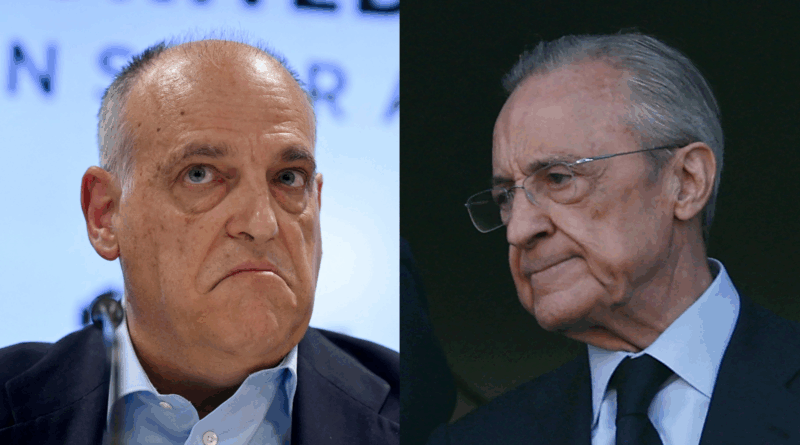Real Madrid Accuse La Liga of Unfair Doping Tests
Real Madrid have raised concerns over La Liga’s handling of doping tests, alleging that the league unfairly targeted the club with a surprise anti-doping visit at their training ground. This accusation has led to a public denial from La Liga president Javier Tebas, who insists there was no special targeting of Los Blancos and has pushed back against claims made by the Spanish giants.
Real Madrid’s Complaints over Doping Tests Spark Controversy
Real Madrid’s concerns came to light after a doping control team arrived unannounced at the club’s training facility on Monday morning. The club swiftly filed an official complaint to FIFA, suggesting that the timing and manner of the inspection were unusual and hinting at a possible agenda against them. The incident has stirred tensions between Real Madrid and La Liga, with the club implying that the league’s authorities may be singling them out for stricter testing.
La Liga President Javier Tebas Responds to Real Madrid
La Liga president Javier Tebas has categorically denied any bias in the administration of doping tests. In his response to Real Madrid’s accusations, he stated, “La Liga is not to blame for everything,” suggesting the club frequently points fingers at the league when challenges arise. Tebas stressed that anti-doping procedures are regulated by external agencies and are not influenced by league officials. He emphasized that all clubs are subject to the same protocols to ensure fairness and transparency within Spanish football.
FIFA Complaint and Broader Implications
Real Madrid’s decision to escalate the issue to FIFA underlines the seriousness with which they view the matter. The club’s leadership believes that such actions not only disrupt team preparations but could also damage the club’s reputation. By seeking intervention from world football’s governing body, Real Madrid aims to prompt a review of how doping controls are assigned and carried out in Spain.
La Liga and Real Madrid: Ongoing Friction
The dispute over doping tests is just the latest chapter in the strained relationship between Real Madrid and La Liga. Tensions have simmered for years, with disagreements over fixture scheduling, television rights, financial regulations, and now, anti-doping procedures. Tebas’s pointed comments highlight a belief within La Liga that Real Madrid tends to externalize blame whenever controversy arises. The club, on the other hand, argues that its stature makes it a frequent target for stricter scrutiny and regulation.
How Doping Controls Are Conducted in La Liga
Doping controls in Spanish football are typically carried out by independent agencies, often in cooperation with national and international authorities such as the Spanish Agency for the Protection of Health in Sport (AEPSAD) and FIFA. Random and unannounced checks are standard protocol to ensure the integrity of the sport. La Liga, while responsible for competition management, does not directly oversee when or where these tests occur. This separation is designed to prevent conflicts of interest and guarantee fair play across all teams.
Real Madrid’s Reputation and Impact on Spanish Football
The high-profile nature of Real Madrid means that any controversy involving the club attracts substantial media attention. As one of the most successful and influential football institutions worldwide, Real Madrid’s interactions with La Liga set a tone for broader debates within Spanish football. Incidents like the recent doping test dispute bring to the forefront questions about governance, transparency, and the balance of power in the domestic game.
What’s Next for Real Madrid and La Liga?
With an official complaint now before FIFA, the outcome of this dispute will be closely watched by clubs, fans, and governing bodies. FIFA may decide to review the allocation process for doping controls in Spain or issue guidelines to ensure a level playing field. Both La Liga and Real Madrid will be keen to resolve the matter swiftly, as ongoing friction could overshadow the sporting achievements and commercial interests of both parties.
Opinion: Seeking Transparency Is Key
The public spat between Real Madrid and La Liga over doping tests highlights the importance of clear, transparent procedures in football. While ensuring the integrity of the sport through robust anti-doping measures is essential, so too is the need for these processes to be perceived as fair by all parties involved. Open communication between clubs, league authorities, and independent agencies will be crucial in maintaining trust and upholding the reputation of Spanish football.
For more updates on this story and all the latest football news, visit for more news.
Your global gateway to nonstop football coverage:
News Goal
Share this content:
